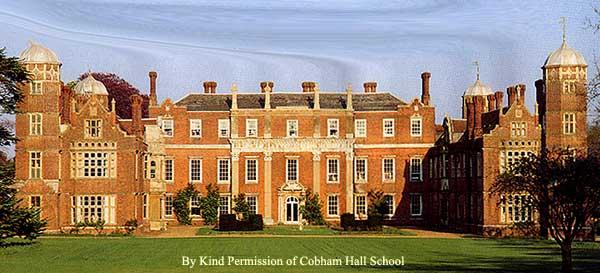
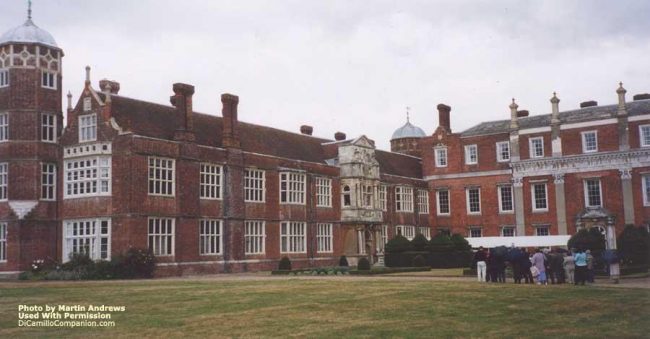
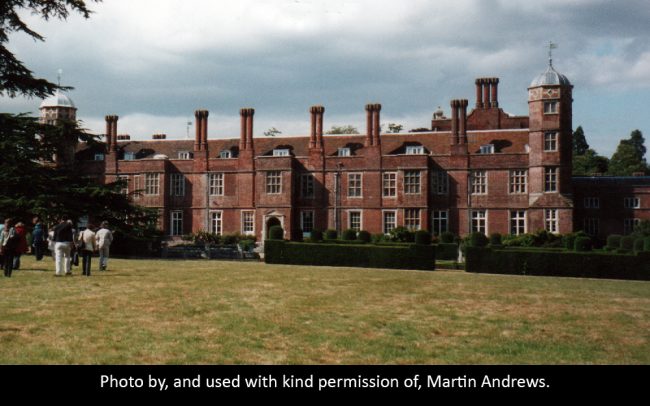
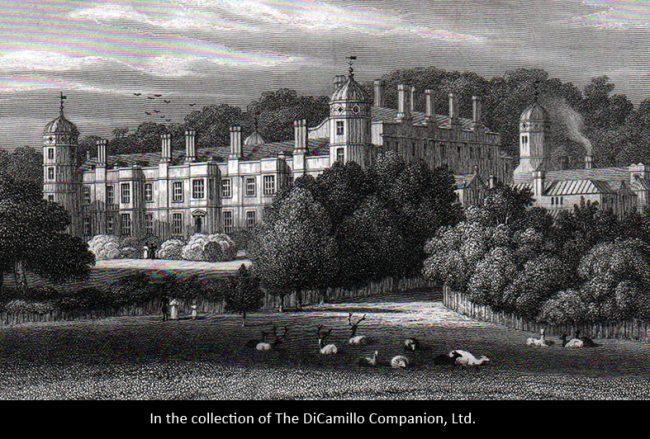
An 1829 engraving of the house from "Neale's Views of Seats"
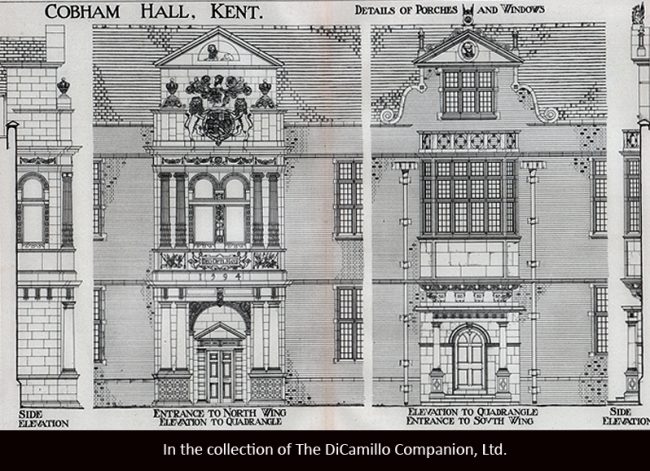
A drawing of the house from the Aug 18, 1908 issue of "The Building News"
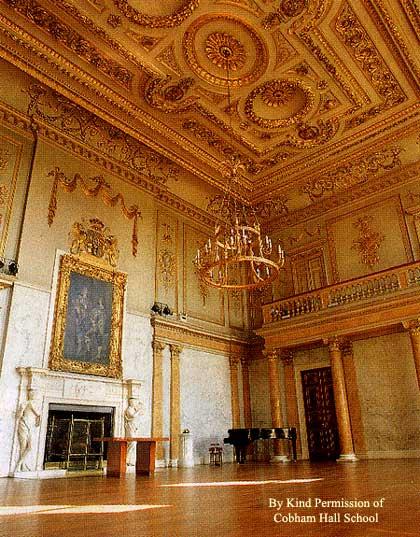
The gilt hall
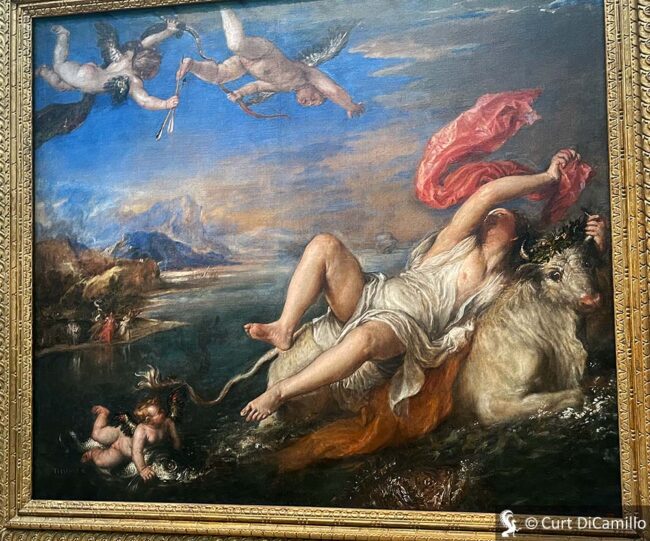
"The Rape of Europa," Titian, circa 1559, today in the collection of the Isabella Stewart Gardner Museum, Boston.
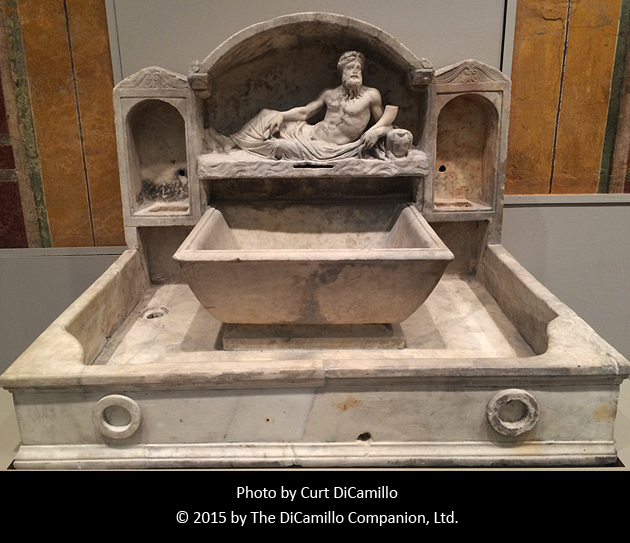
A 1st century marble Roman fountain, formerly in the collection at Cobham, today in the collection of the Museum of Fine Arts, Boston.
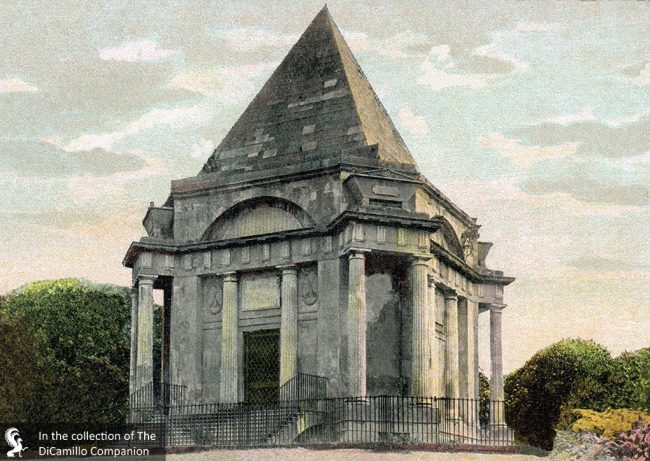
The Darnley Mausoleum from a circa 1905 postcard
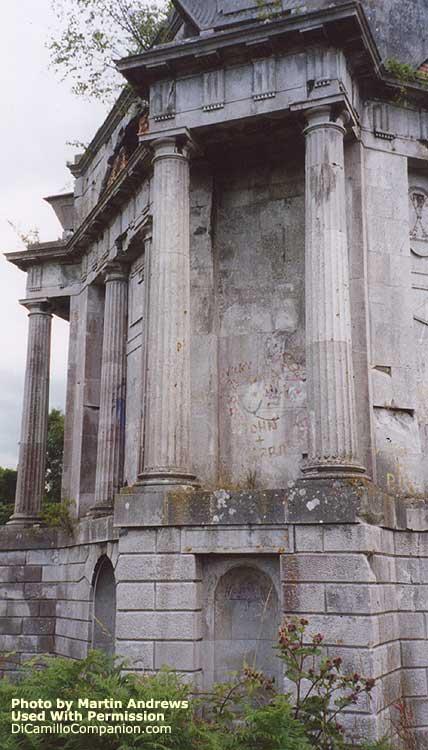
Exterior of the Darnley Mausoleum before restoration
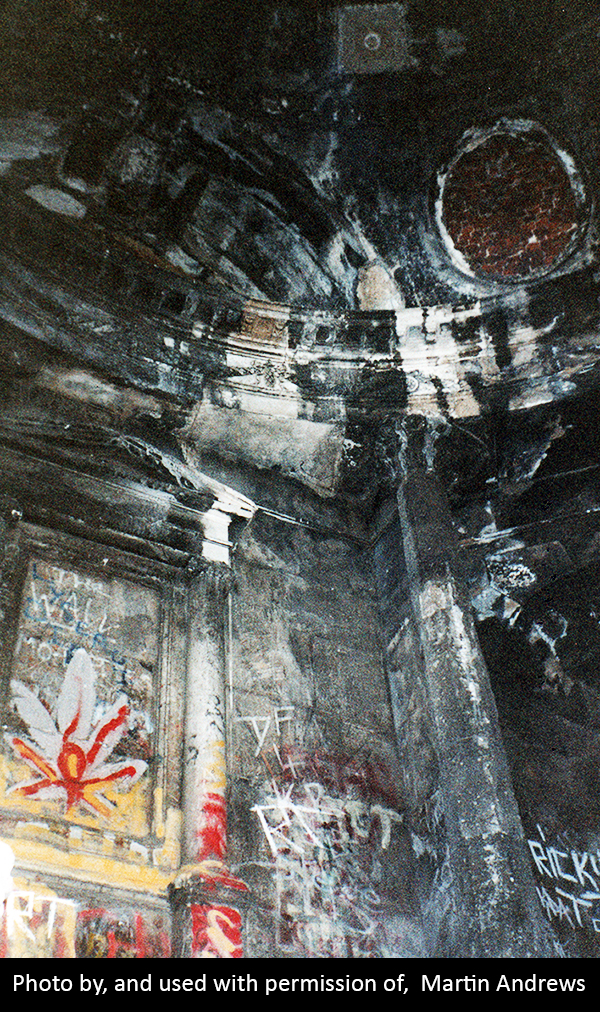
Interior of the Darnley Mausoleum before restoration
Earlier Houses: A manor house existed on the site of the current house as early as the 12th century; this house was fully demolished in 1662.
Built / Designed For: 10th Baron Cobham
House & Family History: Cobham has a long royal history: Queen Elizabeth I visited on two occasions; in 1612 James I gave Cobham to his cousin, Ludovic Stuart, 2nd Duke of Lennox; Charles I spent a night of his honeymoon at Cobham; and Queen Victoria and her mother, the Duchess of Kent, spent a few days at Cobham Hall in 1837, just before Victoria came to the throne. Charles Dickens often walked to the house from his home at Gad's Hill to visit his friend, the 7th Earl of Darnley, and often traversed the grounds on his way to the Leather Bottle pub in Cobham village. Cobham Hall also has a unique place in the history of cricket: the 8th Earl of Darnley captained the English team on the Australian tour of 1882-83. After the English victory, a group of Melbourne ladies ceremoniously burned the bails and presented the ashes to the English captain. The ashes were kept on the library mantelpiece at Cobham Hall until the earl's death, when the countess presented them to the Marylebone Cricket Club. The house's west façade is attributed to the outstanding British architect of the 17th century--Inigo Jones. The jewel in Cobham's architectural crown is the exquisite gilt hall. In the 18th century extensive improvements were carried out, including the conversion of the main hall to a music room. The walls were originally clad in scagliola and embellished with musical motifs and the whole room lavishly gilded. Much of the carved decoration at Cobham was carried out by Thomas Vardy, brother of the architect John Vardy. Cobham Hall remained the family home of the earls of Darnley until 1957; it became the home of Cobham Hall School, a girls' boarding school, in 1962. (We are most grateful to Cobham Hall School for providing much of this history).
Collections: In June of 1896 Bernard Berenson acquired Titian's 1562 "The Rape of Europa," painted for Philip II, King of Spain, from the 6th Earl of Darnley (the painting's ninth owner) for Isabella Stewart Gardner, who paid $100,000 for the masterwork (approximately $16.8 million in 2019 values using the labor value commodity index). The painting, once part of an outstanding collection of Old Masters at Cobham, is today in the Isabella Stewart Gardner Museum, Boston, where it is acknowledged to be one of the greatest Italian paintings in the United States (see photo in "Images" section). The 4th Earl of Darnley acquired "The Rape of Europa” at the 1827 sale of the contents of Attingham Park. In the Dining Room at Broadlands, Hampshire, once hung van Dyck's famous "Lord John Stuart With His Brother, Lord Bernard Stuart," circa 1639. In the 17th and 18th centuries the painting hung at Cobham as part of the collection of the dukes of Lennox (the brothers pictured were the younger sons of the 3rd Duke of Lennox and brothers of the 4th Duke) and the earls of Darnley. Sir Oliver Millar, writing about the painting in "The Treasure Houses of Britain" exhibition catalog: "No picture illustrates more clearly the revolution van Dyck brought about in the development of British portraiture." The painting was sold from Broadlands to The National Gallery, London, in 1987, just a year after it triumphantly returned from the National Gallery of Art's "Treasure Houses" exhibition in Washington. Gainsborough was obsessed with van Dyck's painting, producing a copy of it (today in the collection of the St. Louis Art Museum) in 1785 for the 4th Earl of Darnley. The majority of contents of Cobham were sold by the 8th Earl of Darnley on July 22, 1957. In November 2001 a 1st century AD Roman marble fountain with a reclining river god from Cobham was auctioned at Sotheby's; the fountain is today in the collection of the Museum of Fine Arts, Boston (see "Images" section).
Comments: Cobham has been called, "One of the largest, finest and most important houses in Kent," and is considered one of the finest country houses in England. George IV thought the Gilt Hall at Cobham to be the finest room in England. Speaking of Wyatt's mausoleum of 1783, The Georgian Group said that "its design is of a quality unparalleled in the rest of Wyatt's work or indeed in anyone else's."
Garden & Outbuildings: The 150-acre grounds, once a Medieval deer park, were laid out in the 18th century by Humphry Repton for the 4th Earl of Darnley. The park still retains some magnificent specimen trees planted in the 16th and 17th centuries. James Wyatt designed a Gothic dairy and a rustic cow byre. Lady Darnley's Garden features local sarsen stones and a Tuscan temple, plus an aviary and an orangery. (This history of the Cobham Hall grounds kindly provided by Cobham Hall School). The Grade I-listed Darnley Mausoleum was listed for sale in March of 1999 for £200,000. Built by James Wyatt for the 3rd Early of Darnley, but never consecrated, Pevsner described it as one of the two best mausolea in Britain. The mausoleum and was heavily vandalized in the late 20th century before being gloriously restored in the early 21st century (see photos in "Images" section). In 2003 the park at Cobham received a grant of £4.98 million from the Heritage Lottery Fund, which helped restore the buildings and landscape of Cobham Park. Charles Dickens's Swiss Chalet, once on the grounds of the author's house at Gad's Hill, was used by Dickens as the model for the Nuns' House in "The Mystery of Edwin Drood" and Westgate House Seminary for Young Ladies in "The Pickwick Papers." After Dickens's death, the Chalet was exhibited in London, before being presented to Lord Darnley and erected in the park at Cobham. In 1960 the Grade I-listed chalet was moved to the rear gardens of Medway Council's Eastgate House in Rochester, which was the Charles Dickens Centre from 1979 until 2004.
Chapel & Church: James Wyatt designed the chapel.
Architect: William Oldham Chambers
Date: 1768-70Architect: Peter Mills
Date: 1661-63Architect: James Wyatt
Date: 1771Architect: Inigo Jones
Date: 17th centuryArchitect: James Wyatt
Date: 1780sVitruvius Britannicus: C. II, pls. 29, 30, 1717.
John Bernard (J.B.) Burke, published under the title of A Visitation of the Seats and Arms of the Noblemen and Gentlemen of Great Britain and Ireland, among other titles: Vol. II, p. 143, 1853.
John Preston (J.P.) Neale, published under the title of Views of the Seats of Noblemen and Gentlemen in England, Wales, Scotland, and Ireland, among other titles: Vol. II, 1819.
Country Life: XV, 906, 1904. XCIV, 1124, 1943. CLXXIII, 448, 568, 1983.
Title: Biographical Dictionary of British Architects, 1600-1840, A - HARDBACK
Author: Colvin, Howard
Year Published: 2008
Reference: pg. 697
Publisher: New Haven: Yale University Press
ISBN: 9780300125085
Book Type: Hardback
Title: Mount Vernon Street Warrens: A Boston Story, 1860-1910, The
Author: Green, Martin
Year Published: 1989
Reference: pg. 126
Publisher: New York: Charles Scribner's Sons
ISBN: 0684191091
Book Type: Hardback
Title: Buildings of England: West Kent and the Weald, The 2000
Author: Newman, John
Year Published: 2000
Reference: pg. 233
Publisher: London: Penguin Books
ISBN: 0140710388
Book Type: Hardback
Title: Country Houses of Kent
Author: Oswald, Arthur
Year Published: 1933
Reference: pg. 38
Publisher: London: Country Life Ltd.
ISBN: NA
Book Type: Hardback
Title: Spencer House: Chronicle of a Great London Mansion
Author: Friedman, Joseph
Year Published: 1993
Reference: pg. 75
Publisher: London: Zwemmer
ISBN: 0302006176
Book Type: Hardback
Title: Frick Collection: Handbook of Paintings, The
Author: NA
Year Published: 1990
Reference: pg. 92
Publisher: New York: The Frick Collection
ISBN: 0912114096
Book Type: Softback
Title: Isabella Stewart Gardner Museum: A Companion Guide and History, The
Author: Goldfarb, Hilliard T.
Year Published: 1995
Publisher: New Haven: Yale University Press
ISBN: 0300063415
Book Type: Softback
Title: No Voice From the Hall: Early Memories of a Country House Snooper
Author: Harris, John
Year Published: 1998
Publisher: London: John Murray
ISBN: 0719555671
Book Type: Hardback
Title: Georgian: The Magazine of the Georgian Group, The
Author: NA
Year Published: NA
Reference: January 1999, pg. 13
Publisher: London: The Georgian Group
ISBN: NA
Book Type: Magazine
House Listed: Grade I
Park Listed: Grade II*
Past Seat / Home of: SEATED AT EARLIER HOUSES: de Cobham family, 13th century. SEATED AT CURRENT HOUSE: Sir William Brooke, 10th Baron Cobham, 16th century; Henry Brooke, 11th Baron Cobham, 16th century. Ludovic Stuart, 2nd Duke of Lennox, early 17th century; Esmé Stewart, 3rd Duke of Lennox, early 17th century; Charles Stewart, 3rd Duke of Richmond and 6th Duke of Lennox, 17th century. John Bligh, 3rd Earl of Darnely, 18th century; John Stuart Bligh, 6th Earl of Darnley, 19th century.
Current Ownership Type: Preservation Organization
Primary Current Ownership Use: School
Ownership Details: Owned by Cobham Hall Heritage Trust; since 1962 the home of Cobham Hall School, a day and boarding school for girls.
House Open to Public: Limited Access
Phone: 01474-823-371
Fax: 01474-822-995
Email: [email protected]
Website: https://www.cobhamhall.com/
Historic Houses Member: Yes